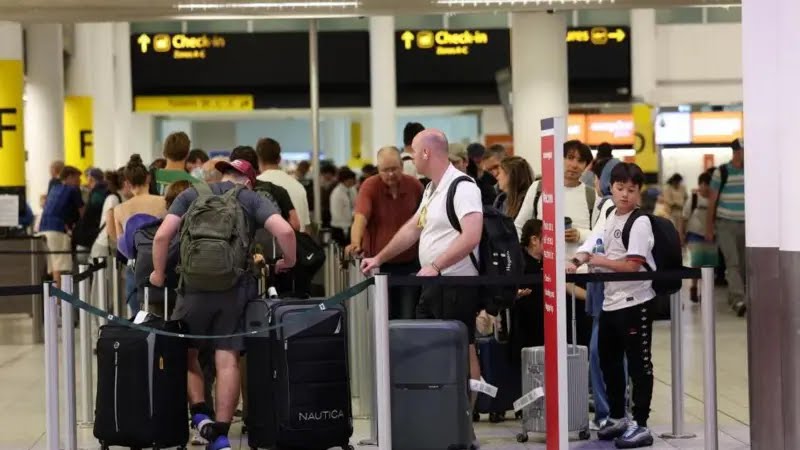Passengers flying to and from the United Kingdom experienced major travel disruption on Wednesday following a short-lived air traffic control system failure that left flights grounded at several of the country’s busiest airports.
Although the technical fault lasted just 20 minutes, it triggered a significant backlog, grounding thousands of aircraft and resulting in widespread delays.
Over 150 UK-bound or departing flights were cancelled by 22:00 BST, with major hubs such as Heathrow, Stansted, Manchester, and Edinburgh most affected.
NATS, the UK’s air traffic control service, attributed the issue to a radar-related fault that was quickly rectified by switching to a back-up system.
The organization emphasized that there was no indication the malfunction had been caused by a cyberattack. In the interim, it reduced the volume of air traffic to prioritize passenger safety.
The government announced that it was “working closely” with NATS to determine the cause of the disruption.
This marks the second major incident involving NATS in two years. A previous failure in August 2023, which coincided with a summer bank holiday, impacted more than 700,000 travelers.
The latest malfunction occurred at NATS’ Swanwick control center in Hampshire, prompting immediate restrictions on the number of aircraft permitted in London airspace.
Engineers restored the affected systems shortly afterward, though many planes remained grounded during the outage and others were rerouted to alternative airports.
As operations resumed, NATS said it was “working with affected airlines and airports to clear the backlog safely”.
British Airways acknowledged the continuing impact of the glitch, stating, “While this is entirely outside of our control, we want to apologise to our customers for any inconvenience and assure them that our teams are working hard to get their journeys back on track as quickly as possible.”
Budget airline EasyJet also advised evening travelers to monitor flight updates and pledged to contact those affected directly.
A spokesperson for Heathrow advised passengers to consult with their airlines before setting off, saying, “We are advising passengers to check with their airline before travelling. We apologise for any inconvenience caused.”
Meanwhile, Birmingham Airport confirmed that its schedule would resume as normal on Thursday, and Manchester Airport anticipated no ongoing effects.
The disruption left some passengers stranded mid-journey. Asha, 18, from Manchester, had boarded a 15:10 EasyJet flight to Amsterdam, which was airborne for 50 minutes before turning back.
She found herself “stuck” on the tarmac around 18:00 and remarked that her “first holiday interrailing [has] gone wrong”. She noted that some passengers wanted to disembark and added she was “hoping for some free food” as compensation.
Another passenger, delayed at Heathrow, said the flight crew shared their frustration. Robin Ilott, 62, from Waterlooville, Hampshire, experienced a two-hour and 20-minute delay.
But he maintained a practical outlook, “It’s better safe than sorry, you don’t want to get up there and find that there’s planes everywhere.”
For others, the disruption had emotional consequences. John Carr, 35, from Stourbridge, had his flight to Norway cancelled while en route to his brother’s wedding.
“We’ve got the wedding rehearsal to do. It’s quite stressful,” he said.
His friend James Hedges, also from Stourbridge, expressed his disappointment, describing the experience as “rubbish” and adding there was “no warning” from either the airport or airline: “There’s nothing we can do.”
The incident sparked criticism from political and aviation leaders. Liberal Democrat leader Ed Davey condemned the situation, saying the government must investigate the “utterly unacceptable” outage.
“With thousands of families preparing to go on a well earned break, this just isn’t good enough,” he said.
Ryanair’s chief operating officer, Neal McMahon, was also scathing in his remarks, describing the disruption as “outrageous.”
He criticized the air traffic control failure and its impact on travelers, stating, “yet another” system malfunction had “resulted in the closure of UK airspace meaning thousands of passengers travel plans have been disrupted” and called for NATS CEO Martin Rolfe to resign.
Flight data analysis from Cirium showed 84 flight departures and 71 arrivals were cancelled across UK airports, 3% and 2% of total flights, respectively.
London Heathrow saw the highest number of disruptions, with 29 outgoing and 17 incoming flights cancelled. Cirium noted that not all of these cancellations could definitively be linked to the air traffic control issue.
Several other flights had to be diverted to airports in mainland Europe, compounding the day’s travel woes.






